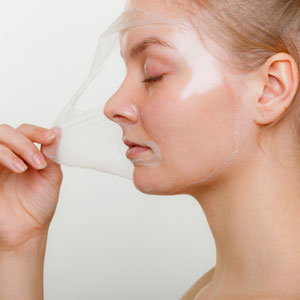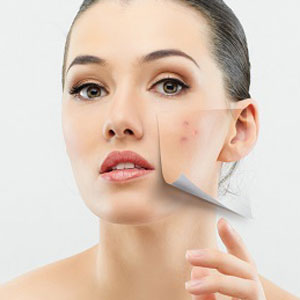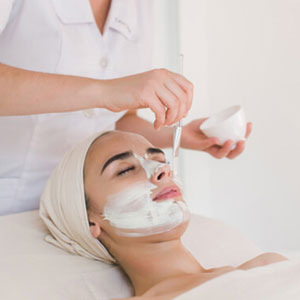The look of our skin is affected by a number of factors, including sun exposure, stress, health, and natural elements. Chemical Peels are a dermatologic treatment that can help you achieve healthier, younger looking skin. This type of treatment is gentle and customizable, making it ideal for many different skin types and conditions, such as:
- Uneven pigmentation
- Rough texture
- Fine lines
- Freckles
- Age spots
- Sun damage
- Acne scarring
How chemical peels work
Chemical peels exfoliate the skin through the topical application of a safe, effective acid solution. Customization comes from adjusting the type of acid used and the duration of time the solution is left on the skin. Through this customization, we are able to achieve superficial, medium, or deep exfoliation to address specific concerns. The chemical exfoliation of the skin removes dead, dull skin cells and reveals fresh, healthy skin for a more vibrant appearance.
Superficial Peel
Light, superficial peels are used to improve the tone and texture of skin that has been damaged by sun exposure. This peel can smooth the skin and achieve a more even tone. Due to the fact that a light acid solution is left on the skin for only a few minutes, superficial peels tend to produce only minor flaking. Patients are typically able to resume normal activities following treatment, taking care to protect the skin from sun exposure. In order to achieve optimal results from superficial treatment, several sessions may take place over the course of a few months.
Medium Peel
Medium peels achieve a deeper exfoliation, affecting the upper dermis as well as the epidermis. This is achieved with a more potent acid solution. Following a medium peel, skin may appear red and slightly swollen. Over the course of five to seven days, the skin will darken and peeling will occur as old cells are replaced with healthy new cells.
Deep Peel
Though a deep peel requires more downtime, it also produces the most dramatic results due to the targeting of cells in the dermis layer of skin. Deep peels may be most suitable for individuals who wish to diminish the appearance of scars, wrinkles, blemishes. A deep peel may also be used to treat precancerous lesions. Due to the depth of this peel, numbing medication may be applied prior to treatment. Warm, stinging sensations may occur during treatment.
A deep peel will produce redness and mild swelling. Sometimes, blisters may appear on the skin. Before peeling occurs, the skin will darken and may become crusty. Over a period of a few weeks, several layers of skin cells will slough off. Throughout the peeling process, skin may appear very red, as if sunburned. This color will fade as peeling ceases and healthy cells normalize on the surface. As the skin heals, it may be kept moist with ointment provided on the day of treatment.
Chemical peels are appropriate for the treatment of many different skin concerns. During your consultation with Dr. Koreen, we will be able to determine which type of peel is best suited to your needs.
What is Chemical Peel? explained by Dr. Roger Koreen

What is a chemical peel treatment?
A chemical peel is a treatment to help with the texture of the skin and any discolorations like brown spots from the sun. How do chemical peels work?
Lighter chemical peels can help with acne and acne scars.
More medium depth chemical peels help even more thick scars and discolorations.
Very deep chemical peels can help more with certain types of wrinkles.
What is the recovery period for each type?
Light peels usually take no recovery time or maybe a day or two of light recovery.
Medium depth peels usually take about 5 days to recover, you look like you have some redness and mild peeling that looks like a bad sunburn.
And heavier deeper peels could take up to 10 days to recover.
See what outstanding dermatologic care can do for your skin. Contact the Dermatology and Cosmetic Laser Center to lean more about Chemical peel – (631) 417-3300.
Side effects
The side effects of peels will vary based on the depth of peel received. Most common side effects include redness and uneven pigmentation. Rarely, scarring may occur if skin care is not optimal. One of the most important tasks after chemical peel treatment is to protect the skin from sun exposure, which can increase the risk of side effects. When we design a treatment plan to include chemical peels, we will discuss how to care for the skin following treatment and how to best maintain the results achieved.
Sun damage, age, stress, and other factors do not have to leave you with unsatisfying skin. Contact our Huntington, NY dermatology practice to learn more about chemical peels.




















